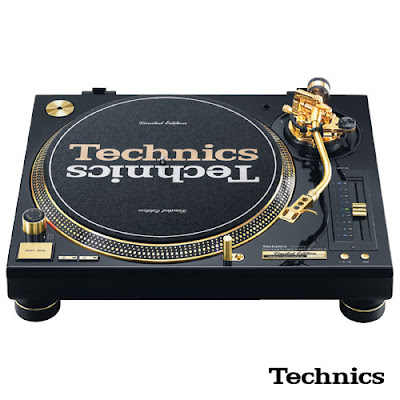
Every DJ in the world will sing the praises of this turntable. For almost everyone, the Technics SL-1200 direct drive table is club music. It's almost impossible to imagine a world of DJ's without it.
There's a vicious civil war in the world of turntables, almost like West Side Story. One gang is devoted to the belt-drive tables, Rega or Pro-Ject or any number of contenders. The second gang is devoted to the direct-drive tables, specifically the Technics SL-1200. There's really no love lost between the two sides. Each one hurls insults at the other, convinced that their table is the true audiophile standard.
My experiences with the Realistic's classic Lab-420 has forced me to rethink this battle. The argument from the belt-drivers is that motor vibration is the greatest problem to overcome. A proper turntable must achieve perfect isolation, and the higher up the food chain you go, the more elaborate the designs.
The argument from the Technics gang is that pitch stability is all that matters. By having the platter connected directly to the motor, the Technics will produce far more stable music than is possible on a belt-drive. This translates into stronger and deeper bass, a wider soundstage, and overall sharper sound.
Belt-drives can counter that problem with speed-control devices, like Pro-Ject's Speed Box and Rega's PSU. And those units really do work; in fact, I'm quite reluctant to consider any turntable that doesn't include one. The improvements made to my humble Debut III by the Speed Box II were stunning, shocking. I couldn't go back to the stock table if you held a gun to my head. And I strongly suspect this is the case with all belt-drivers.
 So does that make the direct-drivers the superior standard? Hard to say. I do know that the Lab-420 beats the Debut III. The only thing keeping my Debut even close is the Denon DL-160 cart, and even then, the Lab stays in the lead. The implications are clear to me. A solid direct-driver may be able to defeat any belt-driver under $1,000.
So does that make the direct-drivers the superior standard? Hard to say. I do know that the Lab-420 beats the Debut III. The only thing keeping my Debut even close is the Denon DL-160 cart, and even then, the Lab stays in the lead. The implications are clear to me. A solid direct-driver may be able to defeat any belt-driver under $1,000.But the belt-drivers are right about motor vibrations. They're also right to address the issue of isolation as best they can. It seems to me that the belt-drive tables will emerge victorious, but only at a certain price point. But how much? One thousand? Two thousand? Meanwhile, the Technics sells for $500 or less.
I ask all these questions because it's time to purchase a new turntable. I've got four weeks to make a decision and pick something. I've enjoyed the Debut III, but it's always been a love/hate affair at best. At the end of the day, it's a basic, entry-level turntable. I need something more hi-fi, something that will keep me happy in the long run.
But where do I go? The Lab has opened my ears to the direct-drivers as never before. I do expect the Technics to be an excellent table. But how does it compete against a Pro-Ject RM6.1? A Pro-Ject Xperience? A Rega P3-24 or P5? Which sounds better? Which will enable the most expensive carts? Will I need to pay for endless upgrades? Is that even something I want at this point? I just want to play my Miles Davis and Pearl Jam records!
We'll see how this plays out. My last couple of turntable purchases were rushed. This time, I intend to get everything right. No regrets.
1 comment:
So what did you purchase? Did you consider a vintage table? Some of those insanely engineered Sonys, Denons and such from the late 70's, which allowed you to install your own tonearm, were pretty amazing pieces of engineering. Then there's the Biotracer servo types. Just wondering what you got.
This post has convinced me to sell my two Thorens 160's after fixing them up, and keeping the Sony biotracer. There's a tiny bit of high-pitched whine in the bearing, which I am sure is due to the bearing getting dry over time. I plan to take the drive apart and lubricate the bearing that supposedly never needs lubing in its lifetime. I guess it's lived longer than the intended lifetime.
At least with the classic Thorens and similar turntables, you could just lift the platter off and lubricate the bearing very easily!
Post a Comment